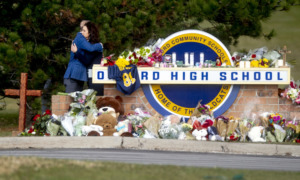
Nomad_Soul/Shutterstock
.
A Newark, N.J., police officer talks about the hostility she experiences from local residents. She is pained that the community won’t look past her uniform — and the assumptions they attach to it — to see that she’s a good person wanting to help.
After she finishes sharing, a woman raises her hand. She repeats the officer’s words almost verbatim — except she replaces the words “police uniform” with her own clothing. She explains the hostility she faces from police. She is pained that the police only ever see a young black person with a hoodie. In a moment, a flash of recognition passes between the two. They begin to see each other differently.
The scene is part of an ongoing program led by Equal Justice USA to reimagine responses to violence by addressing trauma between police officers and residents in cities like Newark.
It’s no small task. The mistrust between people of color and police can feel intractable. Each instance of police violence against black people in America evokes anew the trauma and pain of a justice system that upheld slavery, condoned lynchings, enforced segregation and created mass incarceration. But week after week, people of color in Newark come back and sit down with police officers to face that trauma and work through that history together.
Trauma as a frame for building empathy

Shari Silberstein
The centerpiece of the program is a 16-hour training that brings together small groups of officers and residents to learn about trauma. The course takes place over two or three sessions, one week apart. Participants gain a basic foundation of what trauma is and how it manifests — including how behaviors like aggression, hostility or laziness are also symptoms of trauma.
Included is an essential section on historical trauma — the way the collective trauma of communities or populations can impact future generations. This opens up powerful conversations about structural racism, the history of policing and the relationship between slavery and mass incarceration.
An emphasis on officer trauma encourages officers to be full participants in these conversations when they inevitably get tense or difficult. A co-facilitator from the police department invites the other officers to share their experiences, and most are eager for the opportunity to speak honestly about pain that they normally keep hidden.
I have seen transformation with my own eyes as community members learn about the trauma officers accumulate as they run toward violence day after day, hour after hour, seeing the worst of what humanity can do, without a break or any support to process what they’re seeing. The group begins to build a collective analysis of how officer trauma could impact use of force in the field, making everyone less safe.
The process of helping officers identify and connect with their own trauma becomes a powerful tool to help them understand the trauma experienced by the community. For example, when the police officers begin to understand what racial trauma is, healing begins in real time.
EJUSA facilitators help officers see how even the kindest and most well-intentioned officers carry the history of policing in their badges, bringing that affiliated trauma with them into communities of color every day. Residents share stories of ways police have hurt them — including killing their loved ones — and they experience for the first time what it’s like to have police officers hear and acknowledge their pain.
Building capacity for systems change
Initial data has found that officers who completed the program in its first year have seen a significant drop in civilian complaints. Additional evaluations have found increased knowledge of trauma, trauma-informed techniques and the relevance of trauma to their work and lives. These individual changes are critical for reducing short-term harm in communities that have been most impacted by mass incarceration and over-policing.
The final segment of the trainings brings participants into mixed teams of a few officers and residents to work together and apply what they’ve learned. Given what you now know about trauma, we ask, how can the city be more trauma-informed in how it responds to violence? Teams present their ideas and then sign up to participate in ongoing organizing and advocacy to make these recommendations into reality.
To date, nearly 400 people have completed the training program, including more than 10 percent of the Newark Police Department. EJUSA is working with the department to train the entire police force, and has worked with residents and the department to implement policy changes. We are also in conversation with multiple cities to scale the program nationally.
From local action to new vision for justice
Long term, the goal of this program is to spark deeper culture and systems change to transform the justice system as a whole. Our justice system is based on the unspoken idea that accountability means punishment. When harm happens, society asks one question: What should we do to the person who caused the harm? Lost in that narrow formulation are broader questions about the causes of violence, upstream solutions, what healing looks like, what communities need to be safe and healthy and more.
Transformation requires us to get beyond the punishment paradigm altogether. We must recognize that those who harm and those who have been harmed are often the same people, the same families, the same communities. When we prioritize the values of well-being, restoration and equity, we can redefine justice not as punishment, but as the presence of safety, healing and restorative accountability for everyone touched by harm.
One key to that transformation is addressing trauma. Trauma is everywhere in the justice system — it impacts those harmed by violence, those who commit violence and even professionals working inside the system. EJUSA’s work with police officers in Newark put a theory to the test: Can a focus on trauma cut through polarization, build empathy and shift the narratives necessary to generate new solutions? Based on the results so far, the answer seems to be a resounding yes.
Shari Silberstein is the executive director of Equal Justice USA, a national organization working to transform the justice system by promoting responses to violence that break cycles of trauma.































